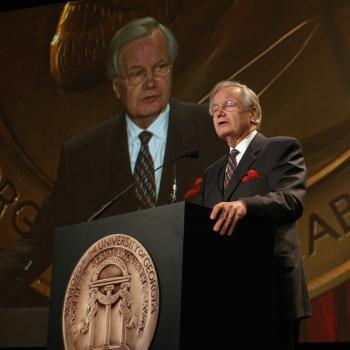
Americans are behind the times when it comes to Father’s Day. We didn’t designate a holiday to honor fathers and father figures until the early 1970s because, in part, American fathers didn’t want one. Why on earth did the idea of Father’s Day initially cause controversy in the United States? We’ll get to the reasons in a moment.
But keep in mind that the idea of honoring fathers dates back several centuries and is deeply steeped in church history. The early Coptic Orthodox Church, for example, set aside a day to honor fathers and father figures in the early 5th century.
So, let’s take a look at when and how churches around the world began to honor fathers and father figures.
The Roots of Father’s Day
The Coptic Orthodox Church set aside a day to honor fathers in roughly 400 A.D., according to Ancestral Findings, a genealogy website. The celebration preceded Catholicism’s recognition of fathers by several centuries.
Catholic nations in Europe decided to honor fathers and father figures around 1508 and designated March 19 – which is St. Joseph’s Day — as the day to celebrate. St. Joseph’s Day recognizes the biblical Joseph who raised Jesus as his own son.
The church still observes Father’s Day on March 19, with some Catholics recognizing their spiritual father, e.g., their parish priest, as well as their earthly fathers.
The Eastern Orthodox Church also began to recognize fathers early on. The church chose the second Sunday before the Nativity to honor Christ’s earthly forefathers and placed special emphasis on Abraham, the patriarch of Jews and Christians (as well as Muslims).
International Men’s Day
“There is an International Men’s Day that many countries around the world celebrate on November 19 each year. This holiday recognizes all men and boys, including fathers,” according to Ancestral Findings.
“So, even in countries without an official Father’s Day, there is an informal one with this internationally celebrated holiday.” Read more here.
Father’s Day in the U.S.
President Richard Nixon officially declared the third Sunday in June as Father’s Day in 1972. In contrast, Mother’s Day became an official holiday in 1914.
Why did Americans take so long to officially honor fathers and father figures?
One reason was the role that men played in family life until the mid- to late-20th century. Until that point, men were their family’s breadwinner, and women took care of the children. Another reason, believe it or not, was that many American men didn’t want an official Father’s Day because they thought it was effeminate.
And who could blame them? President Woodrow Wilson had “called Mother’s Day a way to recognize ‘that tender, gentle army — the mothers of America,’” when he designated the first Mother’s Day in the U.S. in 1914. On their day, mothers often received flowers, which didn’t really appeal men.
The Old Farmers’ Almanac quotes an unnamed historian as saying that men either “scoffed at the holiday’s sentimental attempts to domesticate manliness with flowers and gift-giving, or they derided the proliferation of such holidays as a commercial gimmick to sell more products — often paid for by the father himself.”
The Holiday’s American History
That said, the first Father’s Day service in America was held in 1908 to recognize hundreds of men who died in the worst mining disaster in U.S. history, according to the almanac. The service took place in West Virginia, but it didn’t become an annual observance. Consequently, most Americans never knew it happened.
Meanwhile, a woman named Sonora Smart Dodd of Washington state decided in 1909 that fathers deserved a day of recognition, according to the Farmer’s Almanac. Her father was a prime example of a father who should be honored. A farmer and Civil War veteran, Sonora’s father had raised six children as a single parent after his wife died in childbirth.
“Within a few months, Sonora had convinced the Spokane Ministerial Association and the YMCA to set aside a Sunday in June to celebrate fathers,” the almanac tells us. The ministerial association chose the third Sunday in June, and the first observance in Spokane was held on June 19, 1910.
Sonora delivered presents to handicapped fathers. Boys from the YMCA wore fresh roses on their lapels at church, and Spokane’s ministers delivered sermons that honored fathers.
And unlike the event in West Virginia, this event gained national recognition.
Congress considered a bill designating Father’s Day in 1913. President Wilson supported the idea, but the bill didn’t pass. President Calvin Coolidge signed a resolution recognizing fathers and their relationships with their children several years later.
In 1966, President Lyndon Johnson signed an executive order that designated the third day in June as a day to honor the nation’s fathers. Six years later, Congress officially designated the third Sunday in June as Father’s Day, and President Richard Nixon signed it into law.
And Sonora Smart Dodd saw Father’s Day become a reality across the nation, as she lived until 1978 and died at age 96.
Changing Times
Americans decided to honor fathers and father figures in a more commercial way in the 1930s and 1940s. In the 1930s, the Great Depression left individuals and businesses struggling for economic survival.
In response, Americans bought small gifts to recognize their fathers and support local merchants. The early 1940s were dominated by World War II, and people wanted to honor servicemen with small gifts.
At the war’s end, the role of American fathers began to change, the Old Farmer’s Almanac notes. Fathers were becoming more involved in their children’s lives, which meant their influence became increasingly important.
Honoring Fathers Across the Globe
Today, various nations around the world celebrate Father’s Day on different dates, according to the Old Farmer’s Almanac.
Thailand, for example, celebrates fathers on Dec. 5, which is the birthday of a former king, Bhumibol Adulyadej, and Taiwan honors fathers on Aug. 8, which is the eighth day of the eighth month.
Read more from the almanac by clicking here.
Australia, which celebrated its first Father’s Day in 1922, will mark the day on Sept. 3 this year, according to Bellinguapp, a website that offers an “innovative and fun approach to learning a foreign language.” The day isn’t a national holiday, however.
Germans celebrated their most recent Father’s Day on May 18, 2023. Some German men spend their special day drinking, while others enjoy activities with their families.
Swedes observe the day on the second Sunday in November. Many fathers enjoy breakfast in bed and receive a card and small gift such as a tie or pair of socks, as well as a cake.
South Koreans honor their mothers and fathers on Parents’ Day, rather than setting aside different days for each parent. Children spend more time with their mothers and fathers and give gifts to their parents and grandparents. This year, they celebrated on May 8.
Read more about celebrating Father’s Day around the world on the Bellinguapp website by clicking here.
On a Personal Note
My father died a few days before Father’s Day in 1998. He had suffered from Alzheimer’s and Parkinson’s for several years, and I had prepared myself for the impending loss — or so I thought. When death finally took him, I was devastated.
Dad devoted himself to my mother, sister and me. He was selfless, patient and loving, and I could not have asked for a better role model in my life.
Congenital feet and knee deformities began to rob me of my ability to walk by age 10, and I spent the better part of seven years undergoing surgeries to repair my feet and then my knees. The operations were ultimately successful, but primitive in comparison to current treatments and therapies.
Mother couldn’t do the physical work of lifting me, and I spent most of my days propped up in bed or on the sofa. With Dad at work, we made the best of our circumstances, but our lives were difficult.
Dad’s presence in the evenings made all the difference. Did I need to use the bathroom? No problem. Could I sit at the dinner table with the rest of the family? Certainly. Did I want to watch television in the living room? Of course.
Crutches were useless because I couldn’t bear weight on my legs in the early years, and wheelchairs were hard to find when I really needed one. But I was back on my feet in time to start college.
When I was older, Dad protected me from the wrath of an alcoholic ex-husband and supported me through a long and difficult divorce. During the years that I functioned as a single parent, Dad quietly became a father figure to my children. Their dad was alive, but battling demons I could not imagine.
It’s no exaggeration to say that my life — and the lives of my children — would have been unimaginably hard without Dad.
Yet, I never told him how much I loved him. Not really. We were both quiet people who kept many of our thoughts to ourselves. He knew how I felt, but he would have loved to hear me say the words from time to time.
I have asked God on several occasions to convey those words to Dad. But if I could go back in time, I would tell him,
“You have been the best possible father, and I love you more than you’ll ever know.
“Thank you for all the things you have done for me, the support and encouragement you have given me, and the example you have set. Thank you, too, for enriching my children’s lives by giving them a positive father figure.
“God blessed my life and the lives of my children, and we love you! Happy Father’s Day!”













